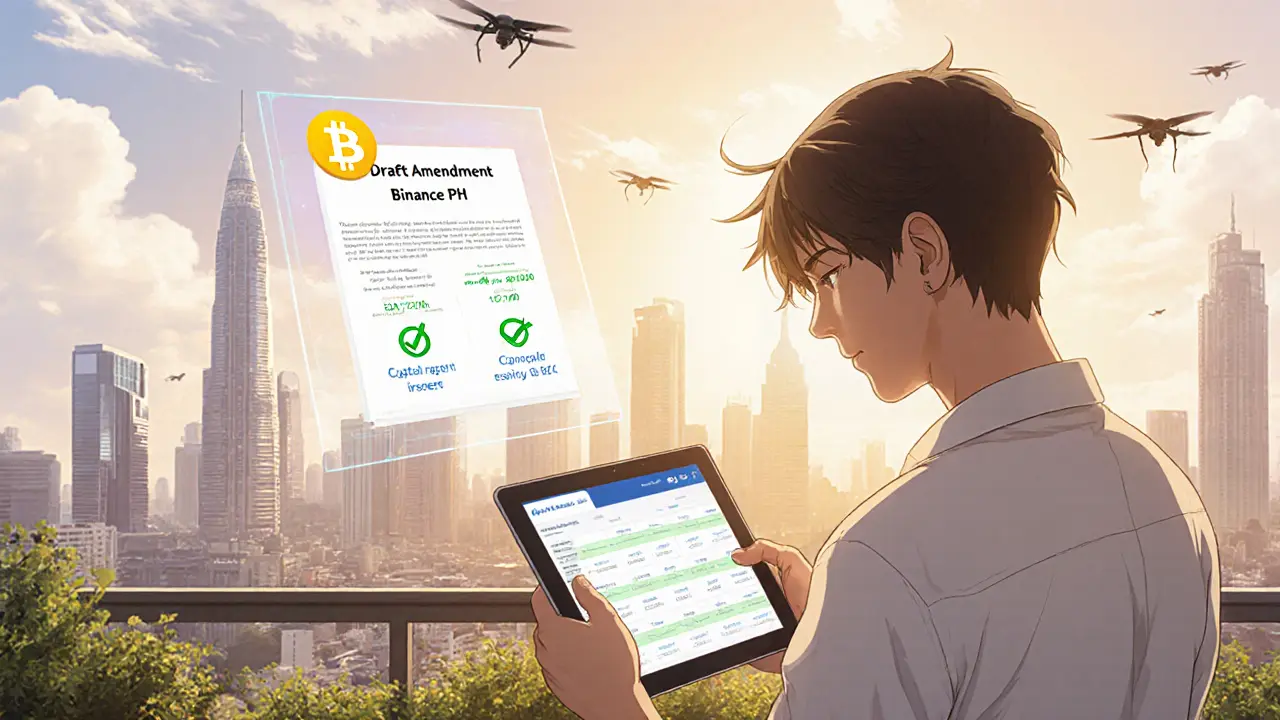Philippines Crypto Exchange Compliance Checker
Check Exchange Compliance
Verify if a crypto exchange meets the Philippines' regulatory requirements for operating legally.
Imagine you’re ready to buy Bitcoin, fire up your favorite app, and get a "site not reachable" message. That’s the reality for thousands of Filipino traders this month - the government has just shut down 20 crypto exchanges that were operating without a license.
Blocked Crypto Exchanges in the Philippines are platforms that provide buying, selling or swapping services for digital assets to Filipino residents while ignoring the country's mandatory registration and capital‑reserve rules. The crackdown, led by the Philippine Securities and Exchange Commission (SEC), marks the biggest wave of enforcement since the digital‑asset regulations took effect in July 2025.
Why the SEC acted now
The SEC’s warning in early August 2025 singled out 10 big names - OKX, Bybit, Mexc, KuCoin, Bitget, Phemex, CoinEx, BitMart, Poloniex and Kraken - for offering services without meeting the licensing thresholds set out in Memorandum Circular No. 4 and No. 5. Those circulars demand:
- A minimum PHP 100 million (≈ $1.76 million) capital reserve.
- Physical incorporation inside the Philippines.
- Separate custody of customer funds.
- Regular reports to the SEC and the Anti‑Money‑Laundering Council.
Platforms that ignore these rules expose users to fraud, loss of funds and tax evasion. After the advisory, the National Telecommunications Commission (NTC) instructed ISPs to block the offending domains, and PLDT - together with its wireless arm Smart Communications - confirmed they had already cut off access on August 12.
Who the new victims are
Beyond the ten exchanges named in the SEC memo, another ten smaller platforms were added to the block list later in the month. While they don’t have the same global liquidity as the big players, they still attracted a sizable local user base. Below is a snapshot of all 20 blocked exchanges, their country of origin, and the primary compliance breach.
| Exchange | Headquarters | Primary Violation | Blocked by |
|---|---|---|---|
| OKX | Malta | No SEC license, insufficient capital | NTC via PLDT/Smart |
| Bybit | Singapore | No SEC license, no Philippine entity | NTC via PLDT/Smart |
| Mexc | Cayman Islands | No registration, AML reporting gap | NTC via PLDT/Smart |
| KuCoin | Seychelles | Capital reserve below PHP 100 M | NTC via PLDT/Smart |
| Bitget | Hong Kong | No local incorporation | NTC via PLDT/Smart |
| Phemex | Singapore | Unregistered, fund commingling risk | NTC via PLDT/Smart |
| CoinEx | Estonia | Failure to file AML reports | NTC via PLDT/Smart |
| BitMart | USA | No Philippine license | NTC via PLDT/Smart |
| Poloniex | USA | No SEC registration | NTC via PLDT/Smart |
| Kraken | USA | Capital reserve shortfall | NTC via PLDT/Smart |
| TradeGate | UK | Unlicensed service provider | NTC via PLDT/Smart |
| CoinSuper | Japan | No local entity, AML lapse | NTC via PLDT/Smart |
| NovaX | Germany | Capital below required threshold | NTC via PLDT/Smart |
| SparkSwap | Canada | Missing SEC registration | NTC via PLDT/Smart |
| Bitrue | Singapore | No Philippine licensing | NTC via PLDT/Smart |
| FinaX | Australia | Insufficient capital reserve | NTC via PLDT/Smart |
| CryptoBridge | Switzerland | Unregistered, AML reporting missing | NTC via PLDT/Smart |
| Bitlamp | India | No local incorporation | NTC via PLDT/Smart |
| Chainlink Exchange | France | Capital reserve below PHP 100 M | NTC via PLDT/Smart |
| AlphaTrade | South Korea | No SEC license, AML gap | NTC via PLDT/Smart |
What the crackdown means for everyday traders
If you’ve been using any of the listed platforms, your first step is to check whether you can still log in. Many users report a generic “page cannot be displayed” error - that’s the ISP-level block in action. The good news is that the assets you already hold on those exchanges are still yours; the block only stops new connections. However, withdrawing funds can become tricky if the exchange’s website is unreachable.
Here are three practical moves:
- Try a VPN or proxy. A reliable VPN can bypass ISP-level filters, letting you reach the exchange’s dashboard to initiate withdrawals.
- Contact the exchange’s support through email or Telegram before the block fully takes effect. Most platforms have pre‑written withdrawal procedures for “restricted jurisdictions.”
- If you can’t get your funds out, file a complaint with the SEC’s Consumer Protection Unit. They’ve set up a fast‑track channel for blocked‑exchange cases.
Keep in mind that using VPNs isn’t illegal in the Philippines, but it does place the onus on you to ensure you’re not violating any anti‑money‑laundering rules while moving large amounts.

Alternative routes for Filipino investors
After the block, many traders switched to locally licensed exchanges such as PDAX, Coins.ph and Binance Philippines (the local subsidiary that complies with SEC rules). These platforms have already met the PHP 100 million capital requirement and keep customer funds in segregated accounts.
Key benefits of staying with a licensed provider:
- Legal protection - you can take the exchange to court if something goes wrong.
- Tax compliance - the SEC’s new rules tie crypto gains to the 15 % capital‑gains tax and 12 % VAT on goods bought with crypto.
- Reduced risk of sudden shutdown - the regulator can order a block only after a formal notice, and licensed providers receive advance warning.
If you prefer a global platform, look for one that has already set up a Philippine subsidiary or that has applied for a local license. Kraken, for example, announced plans to launch a fully registered Philippine arm in early 2026.
How the technical blocking works
When the NTC ordered ISPs to block the domains, the providers added the URLs to their DNS filtering lists and inserted firewall rules that drop packets destined for the exchange’s IP addresses. PLDT’s Cyber Security Operations Group says it has already blocked “more than one hundred billion attempts” on malicious domains in 2025, so the added block list is just another layer.
Network‑level blocking is effective for the average user, but power users can still get through with:
- VPN services that route traffic through servers outside the Philippines.
- Tor Browser - though it can be slow for trading apps.
- DNS over HTTPS (DoH) - bypasses ISP’s DNS filters.
Regulators are aware of these work‑arounds, but they focus on keeping the majority of the population safe, especially those who aren’t tech‑savvy enough to set up a VPN.

What’s next for crypto regulation in the Philippines?
The SEC’s August action is just the start. A draft amendment to MC 4 is expected by early 2026, proposing an even higher capital reserve (PHP 200 million) and mandatory insurance for customer deposits. The government is also looking at a “sandbox” program that lets fintech startups test new services under a lighter regulatory load, provided they don’t handle more than PHP 5 billion in trade volume.
For traders, the takeaway is simple: if a platform can’t prove it has a local licence, expect it to disappear from the internet. Staying with compliant services not only keeps you in the clear with the SEC but also makes tax filing smoother - the new rules require every crypto transaction to be reported through the Bureau of Internal Revenue’s e‑Filings portal.
Quick takeaways
- 20 crypto exchanges, including OKX and Bybit, were blocked in August 2025 for lacking SEC registration and PHP 100 million capital.
- The block is enforced by the NTC through ISP‑level DNS and firewall filters, primarily on PLDT and Smart.
- Use a VPN or contact exchange support to withdraw funds safely.
- Switch to locally licensed providers (PDAX, Coins.ph, Binance Philippines) for legal protection and tax compliance.
- Future rules may raise capital requirements and add insurance mandates - stay alert.
Why did the Philippine government block these exchanges?
The SEC found that the exchanges operated without a local license, failed the PHP 100 million capital reserve rule, and did not keep customer funds separate. Those gaps expose investors to fraud and money‑laundering risks, so the NTC was asked to block them at the network level.
Can I still trade on a blocked exchange using a VPN?
Yes, a reliable VPN can route your traffic through servers outside the Philippines, letting you reach the exchange’s website. However, you’re still responsible for complying with AML and tax rules, and the exchange may limit withdrawals for users in restricted jurisdictions.
What happens to my assets if I can’t withdraw before the block?
The block only stops new connections; your funds remain on the exchange’s ledger. Reach out to the platform’s support channel (email or Telegram) to request a withdrawal. If the exchange becomes unresponsive, you can file a complaint with the SEC’s Consumer Protection Unit for assistance.
Which local exchanges are fully compliant with the new regulations?
PDAX, Coins.ph, and Binance Philippines have secured SEC licenses, meet the capital‑reserve requirement, and keep customer funds in segregated accounts. They also file the mandatory AML and tax reports required by MC 4 and MC 5.
Will future regulations make it harder for foreign exchanges to operate in the Philippines?
Yes. Draft amendments propose raising the capital reserve to PHP 200 million and adding a mandatory insurance fund for user deposits. Exchanges will need a full Philippine subsidiary to meet those thresholds, which could push smaller foreign players out of the market.



Marina Campenni
January 18, 2025 AT 22:18Thanks for the thorough breakdown. It's reassuring to see the authorities taking concrete steps to protect traders.
Irish Mae Lariosa
January 27, 2025 AT 18:46The Philippine Securities and Exchange Commission's recent crackdown underscores a fundamental shift in regulatory philosophy. By insisting on a PHP 100 million capital reserve, the agency signals that financial resilience is non‑negotiable. Moreover, the requirement for a physical Philippine entity eliminates the loophole that offshore platforms have historically exploited. This move also aligns the Philippines with broader ASEAN standards that prioritize consumer protection. It is noteworthy that the SEC targeted both globally recognized exchanges and smaller niche platforms, demonstrating an indiscriminate approach. The involvement of the National Telecommunications Commission illustrates an inter‑agency collaboration rarely seen in previous enforcement actions. While the technical blocking of DNS and IP addresses is effective for the average user, power users will inevitably seek workarounds such as VPNs or Tor. The SEC, however, appears prepared to tolerate these circumvention tools provided that users remain compliant with anti‑money‑laundering statutes. For traders, the immediate priority should be to secure any on‑chain assets by initiating withdrawal procedures before the block solidifies. Contacting exchange support via email or Telegram remains the most reliable channel, as many platforms have pre‑written withdrawal scripts for restricted jurisdictions. In the event that an exchange becomes unresponsive, filing a complaint with the SEC's Consumer Protection Unit is a viable recourse. The forthcoming amendment to Memorandum Circular No. 4, which proposes raising the capital reserve to PHP 200 million, will further tighten the regulatory landscape. Additionally, the mandatory insurance fund for user deposits could mitigate loss in case of platform insolvency. These prospective regulations will likely increase operational costs for foreign exchanges seeking entry, thereby favoring domestically licensed providers. Ultimately, the decisive factor for traders will be the balance between accessibility, compliance, and the perceived safety of their digital assets.
Nick O'Connor
February 6, 2025 AT 01:00Blocking the domains via DNS and firewall rules, executed by the NTC, effectively prevents casual users from accessing the unlicensed exchanges, yet it does not stop determined traders from circumventing the filters, which is why many are turning to VPN services, Tor browsers, and DNS‑over‑HTTPS solutions, all of which route traffic outside the Philippines; the key takeaway is that the technical block is only one layer of a broader regulatory strategy, and users must remain vigilant about compliance.
Matthew Theuma
February 15, 2025 AT 07:13From a philosophical standpoint, the tension between state authority and individual financial liberty is as old as money itself 🤔. The Philippine block illustrates a modern incarnation of that age‑old conflict, where the state imposes order to prevent chaos, and the individual seeks freedom to transact across borders. It's a delicate balance, and while the block may seem restrictive, it arguably protects users from fraud and unchecked risk. Unfortunately, many traders feel blindsided, and the immediacy of the block can cause panic, especially when access disappears overnight 😬. The situation definitly causes us to reflect on how technology reshapes sovereignty.
Carolyn Pritchett
February 24, 2025 AT 13:26The whole crackdown is a massive overreach, a blatant attempt to control every crypto move, and it's a disaster for anyone trying to trade honestly. Those so‑called "protective measures" are nothing more than a power grab by regulators who can't understand modern finance. The blocked exchanges were providing real value, and now users are left stranded with their assets frozen behind a bureaucratic wall. It's a classic case of government fear‑mongering crushing innovation.
Jason Zila
March 5, 2025 AT 19:40Provide a clear, step‑by‑step guide on how to file a complaint with the SEC's Consumer Protection Unit, including the exact forms and required documentation, so affected traders can act without delay.
Cecilia Cecilia
March 15, 2025 AT 01:53Regulators must enforce rules but also ensure transparent communication with users.
lida norman
March 24, 2025 AT 08:06Wow, the block feels like a digital wall dropping out of nowhere! 😱 My crypto feels trapped, and I don't know if I can get it back! The stress is real, and every minute counts! 🙏
Schuyler Whetstone
April 2, 2025 AT 15:20This is exactly why we cant trust these unlicensed platforms, they think they can just ignore the law and get away with it. The SEC finally put them in their place, but many users still dont get how dangerous this was. It's a lesson that crypto gotta follow real rules, no more shady shortcuts. If you keep using dodgy exchanges, you're just askin for trouble. Everyone needs to wake up and see that regulation is actually good for the market.
Pierce O'Donnell
April 11, 2025 AT 21:33Some may argue the block stifles innovation, yet it actually forces exchanges to raise standards and protect investors.
Vinoth Raja
April 21, 2025 AT 03:46The implementation of DNS‑level filtering, orchestrated by the NTC in collaboration with ISP stakeholders, effectively throttles traffic to non‑compliant crypto nodes, thereby inducing a systemic pressure that nudges market participants toward regulated liquidity pools; this network‑centric approach, while technically robust, also introduces latency variables that can affect order execution times, especially for high‑frequency traders operating on thin margins.
Kaitlyn Zimmerman
April 30, 2025 AT 10:00If you're looking for a compliant platform, start with PDAX or Binance Philippines-they meet the capital reserve, keep funds segregated, and file AML reports, making tax filing straightforward and providing legal recourse if anything goes wrong.